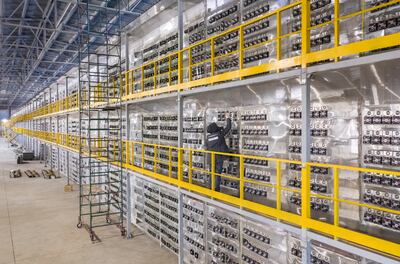Hussain Sajwani, the billionaire founder of Dubai developer Damac Properties, will invest $1 billion to build a global network of cloud data centres as the conglomerate diversifies its operations to include the fast-growing digital sector.
“We’re going to build data centres in Europe, Asia, Africa, the Middle East and CIS,” Mr Sajwani recently told CNBC.
“We want to build a global company and we’re allocating $1bn for that business, and we’re going global to put our footprint in all those four continents,” he added.
founder of Damac Properties
CIS refers to the Commonwealth of Independent States, which comprises Russia and other republics that were formerly part of the Soviet Union.
Demand for data centre infrastructure has grown amid the pandemic as companies increasingly move their business to the cloud amid the disruption caused by Covid-19.
The Middle East and Africa market is among the top three regions worldwide where the public cloud services domain is experiencing the fastest growth, according to International Data Corporation.
Spending on public cloud services in the region is expected to surge to $11.6bn by 2025, growing at an annual rate of 25.5 per cent, IDC said. The UAE, Saudi Arabia and South Africa remain the three biggest markets within the region for spending on cloud, it added.
Mr Sajwani's data centre plan will be part of Edgnex, a wholly owned digital infrastructure company that he founded. He is the venture's chairman.
Damac Properties announced earlier this month that it will officially delist from the Dubai Financial Market after the move was approved at the company’s general assembly meeting.
The meeting approved “the conversion of the legal form of the company from a public joint stock company to a private joint stock company” and authorised the chairman of the board to sign all necessary documents, Damac said in a statement to the DFM on March 7.
Maple Invest, a vehicle fully owned by Mr Sajwani, submitted a notice last year for the mandatory acquisition of all its shares and to take the company private.
The data centres are a natural progression for Mr Sajwani's business, he said.
“The good part about data centres is that your clients are hyperscalers like Microsoft, Amazon, Google, or big banks and institutions. Your contracts are typically for five to 10 years, so you have recurring income. You build an asset with high growth,” he told CNBC.
The data centre idea occurred to Mr Sajwani during the Covid-19 movement restrictions in April and May 2020, he added.
Edgnex has earmarked five plots to develop data centres, including three in Saudi Arabia, two in Turkey and one in Ireland.
“We have the cash to inject and have hired a very good team. We can build data centres at a more reasonable cost than our competitors,” Mr Sajwani said.
“We understand construction much better than our competitors, who are large US private companies. We have worked in emerging markets like the Middle East, while their knowledge in these markets is more limited.”
Edgnex also plans to roll out smaller data centres in the coming years, targeting a market expected to be worth $13.5bn by 2024, according to a recent study by PwC.

In recent years, major technology companies have expanded into the Middle East in the data centre and cloud computing market.
Amazon Web Services will open three data centres in the UAE in the first half of this year to tap into the burgeoning demand for cloud services in the country.
The new centres will enable the company to expand its data storage offering to public and private enterprises, start-ups and educational institutions. In 2019, the Seattle-based company, founded by billionaire Jeff Bezos, opened three data centres in Bahrain.
Other technology companies that have established data centres in the Middle East include SAP, Microsoft, Alibaba and Oracle.


